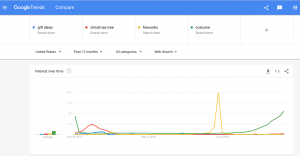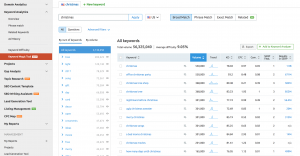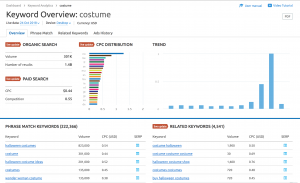Whether your business is in the B2B space or consumer goods, the holiday season presents some unique SEO opportunities to capitalize on, and important pitfalls to avoid.
Ecommerce, brick and mortar retail stores, and even B2B businesses can experience unique opportunities by being visible in search at a time when people are actively shopping, researching, and getting caught up on work. The holidays are a time when there is a huge uptick in SEO activity, including purchasing through ecommerce and in-person at retail stores.
SEO strategy and content planning as we approach 2019
Much has changed in the SEO space over the past years, but the message from search engines like Google has not changed all that much. The name of the game is still to create better content and a better experience on your website for users, based on specific user search intent.
When forming your SEO strategy for the holidays you need to identify the problems your customers will be looking to solve, and how you can present the best solution. Here are the steps you should take in forming your SEO content strategy for the holidays.
1. Keyword research
Perform an exhaustive analysis of the keywords being used by your customers when they are searching for your products or services. Consider the specific issues your customers might have during the holidays related to your business. Visit competitor sites to identify the keywords they are targeting; Screaming Frog is a great tool to crawl a website and pull meta-data for all accessible pages. Use SEMrush to see current ranking terms for your website as well as competitors.
You can use a variety of SEO tools to perform keyword research including: Google Keyword Planner, SEMrush, Moz, Wordstream, and a variety of others. Identify all variations and organize into broad groups. Once you have created broad keyword groups (and even during research), it’s a good idea to check intent by examining search results for your chosen terms. Make sure the results line up with the subject matter and type of content that makes sense for your business.
2. Competitive SEO research
Once you have identified the keywords you are looking to rank for, take the time to examine the web pages that are dominating the search results. What about them is done well, where are they falling short? What types and depths of content are being showcased? Is it short informational videos explaining how to diagnose a home-improvement problem (like a broken garbage disposal at a holiday party), an extensive written blog post on fixing the issue, or is it a directory filled with local repair specialists?
You will want to fit in with what is already there as much as possible. You might write the one blog post that outranks all the ecommerce product pages, but this is less likely. The goal is to understand the intent of your audience and present the best solution possible. Google search results pages are your best resource here, the SERPs offer powerful data and insights into the intent and search behavior of your audience.
3. Content planning
If you have completed thorough keyword and competitor research, you should have some ideas on the types of content you want to create in order to outperform the competition. Focus on providing better information, easier and more straightforward solutions, and plenty of details so the user gets everything they need without leaving the page.
Organize content so it is easy to digest visually; use bullet points, simple charts, images, and videos. Keep text short enough to scan, with plenty of headings and sub sections so users can easily find the information they want. Lastly, research questions that your audience is asking related to the keywords you are targeting. Including questions with thorough and accurate explanations within your content is a good way to target voice search and rich snippets.
Ecommerce SEO during the holidays
If you sell products online through ecommerce, the holidays should already be on your radar and you likely have already been forming a strategy to maximize sales. SEO is still one of the biggest drivers of traffic and online sales across the board, so a well-crafted SEO strategy should be central to your overall digital strategy.
It’s still the same SEO
The rules for SEO don’t change with the season, so the same rules you follow the rest of the year still apply. The big difference is the stakes, and during the holidays the stakes are very high for many ecommerce stores. There are some things you can do to research seasonal SEO trends in order to create a strategy that capitalizes on the very best opportunities. If you can get access to monthly search volume for your target keywords (instead of just monthly average searches) you can plan ahead and target terms that you know are big during the holidays. Google Trends is also a great resource for identifying these kinds of seasonal SEO fluctuations across various keywords and topics.
In-person retail sales
While many brick & mortar retail businesses may not think about digital presence and SEO during the holidays, this is a major mistake to avoid. Lots of businesses don’t sell online and still depend on SEO visibility to drive foot traffic and in-person sales. If you are a business that gets lots of foot traffic during the holidays, you will want to make sure your local SEO listings are accurate, visible, and provide all credibility factors possible so that you’re the destination of choice for holiday shoppers who need what you’re selling.
Local SEO listing management
Make sure you have claimed your Google My Business page, that it is filled out as much as possible and has updated information and pictures. Make sure your important product/service categories are listed wherever possible, and there is a link to your website (if you have one). Lastly, make sure your name, address, phone number, and hours are accurate! If you stay open later during the holidays, you better make sure your listing doesn’t say you’re closed. You can use free audits from tools like Yext & Moz Local to check your local listings and get a list of other local directory sites you will want to claim and update your business listings on (most can be done for free with a little extra research). Although, be aware you may receive a sales call after using Yext as your info may be passed to their sales team. Both are solid services for managing local listings, and for the price Bright Local is another great option.
SEO for B2B businesses during the holidays
B2B businesses are the last type you might expect to have big SEO opportunities during the holidays, but you would be wrong! Although many B2B businesses are pretty dead during the holidays, the key stakeholders, c-suite executives, and other senior management personnel are often using this time to catch up on work initiatives and other high priority tasks they couldn’t fit in before the break.
Businesses opportunities from SEO can definitely materialize around the holidays. While search volume goes down for many B2B business topics, there are also amazing opportunities that can pop up from people filling out online forms or leaving messages during the holiday break. If you can get ahead with your SEO plan and be visible in the right spots when this time hits, you might find that your competition is out to lunch when the big opportunity you have been waiting for arrives as a result of your SEO strategy.
Tax write-offs
Another big consideration around the holidays is how businesses can lower their tax liability, SEO is a great investment around this time. The truth is that if you are waiting till the holidays to develop your SEO strategy, you’re unlikely to be successful. The good news is you have a huge opportunity to get ahead for next year!
Many businesses put off SEO investment until the new year because of annual budgets and the previous year’s planning. End of the year is a great time to get ahead and gives you an advantage over competitors who kickstart new SEO programs after the new year (of which there are always a ton). There is a great deal of SEO work that requires heavy research and planning in the initial phases and making these big investments at the end of the year can get you a few months ahead of the competition.
The holidays are a great time to take advantage of increased activity and purchase behavior, but it’s critical that you plan ahead and cover your bases. If you dedicate the proper time and resources into developing a well-crafted SEO strategy, you can capitalize on some significant opportunities during the holidays and reap huge rewards.
Chris Rodgers is CEO of Colorado SEO Pros.
https://searchenginewatch.com/2018-seo-strategy-holidays




